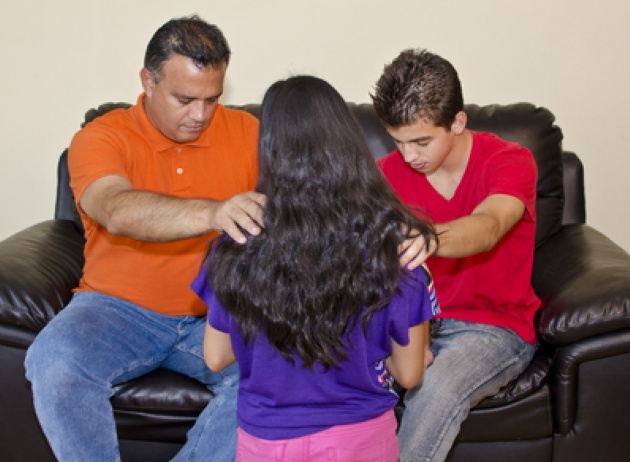We care about our children.
We care about their education, their physical health and their emotional
wellbeing. We want them to be happy, to
grow up feeling connected to their families, their communities and
themselves.
Would you be surprised to know that the latest studies on
children’s feelings of wellbeing are reporting that those children that have a
sense of a “greater power” are happier, better adjusted and less prone to being
led astray by friends as they get older?
Our children’s spiritual health is not something we often think
about. Many of us carry negative
memories of our own religious upbringing, or we have no memories at all,
because our parents felt that we could choose our religious affiliation when we
got older. Unfortunately, this has led
to at least two generations of children who have nowhere to reference any of
their spiritual questions.
I hear you object, saying spirituality and religion are two
different things. And I would agree with
you. But I also know that having no
frame at all, no place to ask and explore spiritual questions, leaves our
children feeling alienated from themselves, their families and their
communities.
The truth is that children have both spiritual gifts to
offer to others as well as spiritual needs.
We, as adults, are called to learn from their gifts of wonder, of being
present in the moment, their playfulness and enthusiasm. We are also called to
nurture and guide these gifts if we are to raise children who are compassionate,
grounded in their family, connected to their community, reflective and
self-confident.
In a world where media will have a tremendous impact on what
our children believe, want and strive for, (in which the dominant message is
that happiness can be bought) it becomes even more important to offer an
alternative understanding of what it means to be human. We often measure wellbeing as happiness or satisfaction with life.
The search for happiness is often confused with the pursuit of pleasure, but wellbeing
is about more than living ‘the good life’; it is about having meaning in life,
about fulfilling our potential and feeling that our lives are worthwhile.
(Eckersley, 2005) ¹
In the United Church of Canada, children are seen as equal
partners in the spiritual journey. They
have as much to give as they have to receive. In fact, all of creation is seen
this way, fostering respect for all that God has created.
At Northlea United Church, here in Laval, we strive to find
ways to bring this belief into our worship and our outreach programs. In order for children to explore their
spirituality, they need a place where they can feel completely safe, loved and
accepted, a place that will not so much gives them the answers; but, provide
the space where answers can be sought in partnership.
Our community garden reserves a space for the children every
spring, so that they might experience in a concrete way the awesomeness of this
earth with which we have been blessed and the life cycle of all things; birth,
life, death and new life out of death (something we adults have a difficult
time accepting).
We have also come to recognize that new Moms and Dads often
feel isolated and crave a place where they can come together and share their
experiences, their questions, their joys and difficulties. Our Time for Tots program, which meets
weekly, was developed to be just such a place.
Our Children’s Sunday School provides a safe space, where,
through various crafts and stories, children can find their special place in God’s
living story. As well, once a month, we
have a Family Service which begins with breakfast and allows for the noisiness,
curiosity and the constant movement of younger children.
At Northlea United Church, we believe that ‘church’ is a
verb and not a noun. We come together as
church to support each other on life’s spiritual journeys, to welcome all
people regardless of culture, age or sexual orientation and, to be a blessing
to the world God has created.
Northlea United Church
3200 5th St.
Chomedey, Laval
450 681-9836
¹ Eckersley,
R. 2005. What
is wellbeing? The Wellbeing Manifesto website www.wellbeingmanifesto.net (accessed 8 November 2012)

 In The Latest Issue:Latest Issue:
In The Latest Issue:Latest Issue:
- A Bittersweet Farewell
- The new Laval Aquatic Co...
- The End of an Era:
Articles
Calendar
Virtual- ANNUAL TEACHER APPRECIATION CONTEST
- APPUI LAVAL
- ARTS & CULTURE
- CAMPS
- CAR GUIDE
- CCIL
- CENTENNIAL ACADEMY
- CHARITY FUNDRAISING
- CITYTV
- COSMODÔME
- COMMUNITY CONNECTIONS
- COVER STORY
- DINA DIMITRATOS
- ÉCOLE SUPÉRIEURE DE BALLET DU QUÉBEC
- EDITORIALS
- ÉDUCALOI
- EDUCATION
- EMPLOYMENT & ENTREPRENEURSHIP
- FÊTE DE LA FAMILLE
- FÊTE DU QUARTIER SAINT-BRUNO
- FAMILIES
- FESTIVAL LAVAL LAUGHS
- FÊTE DE QUARTIER VAL-DES-BRISES
- FINANCES
- GLI CUMBARE
- GROUPE RENO-EXPERT
- HEALTH & WELL-BEING
- 30 MINUTE HIT
- ANXIETY
- CHILDREN`S HEALTH & WELLNESS
- CLOSE AID
- DENTAL WELLNESS
- EXTREME EVOLUTION SPORTS CENTRE
- FONDATION CITÉ DE LA SANTÉ
- GENERAL
- HEARING HEALTH
- MESSAGES FROM THE HEALTH AGENCY OF CANADA
- MENTAL HEALTH
- SEXUALITY
- SOCIAL INTEGRATION
- SPECIAL NEEDS
- TEENS
- THE NUTRITION CORNER
- THE NUTRITION CORNER - RECIPES
- VACATION DESTINATION
- WOMEN'S FITNESS
- WOMEN'S HEALTH
- HILTON MONTREAL/LAVAL
- HOME & GARDEN
- INTERNATIONAL WOMEN'S DAY
- JAGUAR LAVAL
- LAVAL À VÉLO
- LAVAL FAMILIES TV SHOW
- LAVAL FAMILIES MAGAZINE CARES
- LAVAL URBAN IN NATURE
- LE PARCOURS DES HÉROS
- LES PETITS GOURMETS DANS MA COUR
- LEON'S FURNITURE
- LEONARDO DA VINCI CENTRE
- LFM PREMIERES
- LIFE BALANCE
- M.P. PROFILE
- MISS EDGAR'S AND MISS CRAMP'S SCHOOL
- MISSING CHILDREN'S NETWORK
- NETFOLIE
- NORTH STAR ACADEMY LAVAL
- OUTFRONT MEDIA
- PASSION SOCCER
- PARC DE LA RIVIÈRE-DES-MILLE-ÎLES
- PÂTISSERIE ST-MARTIN
- PIZZERIA LÌOLÀ
- PLACE BELL
- PORTRAITS OF YOUR MNA'S
- ROCKET DE LAVAL
- SACRED HEART SCHOOL
- SCOTIA BANK
- SHERATON LAVAL HOTEL
- SOCIÉTÉ ALZHEIMER LAVAL
- STATION 55
- STL
- SUBARU DE LAVAL
- TECHNOLOGY
- TEDXLAVAL
- TODAY`S LAURENTIANS AND LANAUDIÈRE
- TODAY`S LAVAL
- WARNER MUSIC
- THIS ISSUE
- MOST RECENT
Magazine
Spirituality and Children
Articles ~e 105,7 Rythme FM 4 chemins Annual Teacher Appreciation Contest Appui Laval Arts & Culture Ballet Eddy Toussaint Camps THIS ISSUE MORE...
CONTESTS Enter our contests
CONTESTS Enter our contests
CALENDAR
Events & Activities
COMMUNITY Posts Events
PUBLICATIONS Our Magazine Family Resource Directory
LFM BUSINESS NETWORK Learn more
COUPONS Click to save!
COMMUNITY Posts Events
PUBLICATIONS Our Magazine Family Resource Directory
LFM BUSINESS NETWORK Learn more
COUPONS Click to save!
SUBSCRIPTIONS
Subscribe to the magazine
Un-Subscribe
E-NEWSLETTER Subscribe to our E-newsletter Un-Subscribe
WRITE FOR US Guidelines & Submissions
POLLS Vote today!
E-NEWSLETTER Subscribe to our E-newsletter Un-Subscribe
WRITE FOR US Guidelines & Submissions
POLLS Vote today!
ADVERTISERS
How to & Media guide
Pay your LFM invoice
SUGGESTIONS Reader's Survey Suggest a Listing
LFM About Us Our Mission Giving Back Contact Us
SUGGESTIONS Reader's Survey Suggest a Listing
LFM About Us Our Mission Giving Back Contact Us
 PICK-UP LOCATIONS
Get a copy of LFM!
PICK-UP LOCATIONS
Get a copy of LFM!
TERMS & CONDITIONS Privacy | Terms
ISSN (ONLINE) 2291-1677
ISSN (PRINT) 2291-1677
Website by ZENxDESIGN



 BY:
BY: 
Tweet
Share